Spartacus is a 1960 American epic historical drama film directed by Stanley Kubrick, written by Dalton Trumbo, and based on the novel of the same title by Howard Fast. It is inspired by the life story of Spartacus, the leader of a slave revolt in antiquity, and the events of the Third Servile War, and stars Kirk Douglas in the title role, Laurence Olivier as Roman general and politician Marcus Licinius Crassus, Peter Ustinov, who won an Academy Award for Best Supporting Actor, as slave trader Lentulus Batiatus, John Gavin as Julius Caesar, Jean Simmons as Varinia, Charles Laughton as Sempronius Gracchus, and Tony Curtis as Antoninus.
| Spartacus | |
|---|---|
Theatrical release poster by Reynold Brown | |
| Directed by | Stanley Kubrick |
| Produced by | Edward Lewis |
| Screenplay by | Dalton Trumbo |
| Based on | Spartacus by Howard Fast |
| Starring |
|
| Music by | Alex North |
| Cinematography | Russell Metty |
| Edited by | Robert Lawrence |
Production company | Bryna Productions |
| Distributed by | Universal International |
Release date |
|
Running time | 184 minutes |
| Country | United States |
| Language | English |
| Budget | $12 million |
| Box office | $60 million |
Douglas, whose company Bryna Productions was producing the film, removed original director Anthony Mann after the first week of shooting. Kubrick, with whom Douglas had worked before, was brought on board to take over direction. It was the only film directed by Kubrick where he did not have complete artistic control. Screenwriter Dalton Trumbo was blacklisted at the time as one of the Hollywood Ten. Douglas publicly announced that Trumbo was the screenwriter of Spartacus, and President-elect John F. Kennedy crossed American Legion picket lines to view the film, helping to end blacklisting; Howard Fast was also blacklisted, and originally had to self-publish it.
The film won four Academy Awards and became the biggest moneymaker in Universal Studios' history, until it was surpassed by Airport (1970). In 2017, it was selected for preservation in the United States National Film Registry by the Library of Congress as being "culturally, historically, or aesthetically significant".
Screenplay
In the 1st century BC, the Roman Republic has slid into corruption, its menial work done by armies of slaves. One of these, a proud and gifted Thracian named Spartacus (Kirk Douglas), is so uncooperative in his position in a mining pit that he is sentenced to death by starvation. By chance, he is displayed to unctuous Roman businessman Lentulus Batiatus (Peter Ustinov), who - impressed by his ferocity - purchases Spartacus for his gladiatorial school, where he instructs trainer Marcellus (Charles McGraw) to not overdo his indoctrination because he thinks "he has quality". Amid the abuse, Spartacus forms a quiet relationship with a serving woman named Varinia (Jean Simmons), whom he refuses to rape when she is sent to "entertain" him in his cell. Spartacus and Varinia are subsequently forced to endure numerous humiliations for defying the conditions of servitude.
Batiatus receives a visit from the immensely wealthy Roman senator Marcus Licinius Crassus (Laurence Olivier), who aims to become dictator of the stagnant republic. Crassus buys Varinia on a whim, and for the amusement of his companions arranges for Spartacus and three others to fight in pairs. When Spartacus is disarmed, his opponent, an African named Draba (Woody Strode), spares his life in a burst of defiance and attacks the Roman audience, but is killed by an arena guard and Crassus. The next day, with the ludus' atmosphere still tense over this episode, Batiatus takes Varinia away to Crassus's house in Rome. Spartacus kills Marcellus, who was taunting him over his affections, and their fight escalates into a riot. The gladiators overwhelm their guards and escape into the Italian countryside.
Spartacus is elected chief of the fugitives and decides to lead them out of Italy and back to their homes. They plunder Roman country estates as they go, collecting enough money to buy sea transport from Rome's foes, the pirates of Cilicia. Countless other slaves join the group, making it as large as an army. One of the new arrivals is Varinia, who escaped while being delivered to Crassus. Another is a slave entertainer named Antoninus (Tony Curtis), who also fled Crassus's service. Privately, Spartacus feels mentally inadequate because of his lack of education during years of servitude. However, he proves an excellent leader and organizes his diverse followers into a tough and self-sufficient community. Varinia, now his informal wife, becomes pregnant by him, and he also comes to regard the spirited Antoninus as a sort of son.
The Roman Senate becomes increasingly alarmed as Spartacus defeats the multiple armies it sends against him. Crassus's populist opponent Gracchus (Charles Laughton) knows that his rival will try to use the crisis as a justification for seizing control of the Roman army. To try and prevent this, Gracchus channels as much military power as possible into the hands of his own protege, a young senator named Julius Caesar (John Gavin). Although Caesar lacks Crassus's contempt for the lower classes of Rome, he mistakes the man's rigid outlook for nobility. Thus, when Gracchus reveals that he has bribed the Cilicians to get Spartacus out of Italy and rid Rome of the slave army, Caesar regards such tactics as beneath him and goes over to Crassus.
Crassus uses a bribe of his own to make the pirates abandon Spartacus and has the Roman army secretly force the rebels away from the coastline towards Rome. Amid panic that Spartacus means to sack the city, the Senate gives Crassus absolute power. Now surrounded by Romans, Spartacus convinces his men to die fighting. Just by rebelling and proving themselves human, he says that they have struck a blow against slavery. In the ensuing battle, after initially breaking the ranks of Crassus's legions, the slave army ends up trapped between Crassus and two other forces advancing from behind, and most of them are massacred. Afterward, the Romans try to locate the rebel leader for special punishment by offering a pardon (and return to enslavement) if the men will identify Spartacus, living or dead. Every surviving man responds by shouting "I'm Spartacus!" (an idea from Fast's novel, not documented by history). As a result, Crassus has them all sentenced to death by crucifixion along the Via Appia between Rome and Capua, where the revolt began.
Meanwhile, Crassus has found Varinia and Spartacus's newborn son and has taken them prisoner. He is disturbed by the idea that Spartacus can command more love and loyalty than he can and hopes to compensate by making Varinia as devoted to him as she was to her former husband. When she rejects him, he furiously seeks out Spartacus (whom he recognizes from having watched him at Batiatus' school) and forces him to fight Antoninus to the death. The survivor is to be crucified, along with all the other men captured after the great battle. Spartacus kills Antoninus to spare him this terrible fate. The incident leaves Crassus worried about Spartacus's potential to live in legend as a martyr. In other matters, he is also worried about Caesar, whom he senses will someday eclipse him.
Gracchus, having seen Rome fall into tyranny, commits suicide. Before doing so, he bribes his friend Batiatus to rescue Spartacus's family from Crassus and carry them away to freedom. On the way out of Rome, the group passes under Spartacus's cross. Varinia is able to comfort him in his dying moments by showing him his little son, who will grow up free and knowing who his father was.
- Kirk Douglas as Spartacus
- Laurence Olivier as Crassus
- Jean Simmons as Varinia
- Charles Laughton as Gracchus
- Peter Ustinov as Batiatus
- Tony Curtis as Antoninus
- John Gavin as Julius Caesar
- John Dall as Marcus Glabrus
- Nina Foch as Helena Glabrus
- John Ireland as Crixus
- Herbert Lom as Tigranes Levantus (pirate envoy)
- Charles McGraw as Marcellus
- Joanna Barnes as Claudia Marius
- Harold J. Stone as David
- Woody Strode as Draba
- Peter Brocco as Ramon
- Paul Lambert as Gannicus
- Robert J. Wilke as Guard Captain
- Nick Dennis as Dionysius (credited as Nicholas)
- John Hoyt as Caius
- Frederick Worlock as Laelius (credited as Frederic)
The development of Spartacus was partly instigated by Kirk Douglas's failure to win the title role in William Wyler's Ben-Hur. Douglas had worked with Wyler before on Detective Story, and was disappointed when Wyler chose Charlton Heston instead. Shortly after, Edward (Eddie) Lewis, a vice president in Douglas's film company, Bryna Productions (named after Douglas's mother), had Douglas read Howard Fast's novel, Spartacus, which had a related theme—an individual who challenges the might of the Roman Empire—and Douglas was impressed enough to purchase an option on the book from Fast with his own financing. Universal Studios eventually agreed to finance the film after Douglas persuaded Olivier, Laughton, and Ustinov to act in it. Lewis became the producer of the film, with Douglas taking executive producer credit. Lewis subsequently produced other films for Douglas.
At the same time Yul Brynner was planning his own Spartacus film for United Artists with Douglas's agent Lew Wasserman suggesting he try having his film produced for Universal Studios. With Dalton Trumbo's screenplay being completed in two weeks, Universal and Douglas won the "Spartacus" race.
Screenplay development
Howard Fast was originally hired to adapt his own novel as a screenplay, but he had difficulty working in the format. He was replaced by Dalton Trumbo, who had been blacklisted as one of the Hollywood Ten, and intended to use the pseudonym "Sam Jackson".
Kirk Douglas insisted that Trumbo be given screen credit for his work, which helped to break the blacklist. Trumbo had been jailed for contempt of Congress in 1950, after which he had survived by writing screenplays under assumed names. Douglas's intervention on his behalf was praised as an act of courage.
In his autobiography, Douglas states that this decision was motivated by a meeting that he, Edward Lewis, and Kubrick had regarding whose name(s) to put against the screenplay in the film credits, given Trumbo's shaky position with Hollywood executives. One idea was to credit Lewis as co-writer or sole writer, but Lewis vetoed both suggestions. Kubrick then suggested that his own name be used. Douglas and Lewis found Kubrick's eagerness to take credit for Trumbo's work revolting, and the next day, Douglas called the gate at Universal saying, "I'd like to leave a pass for Dalton Trumbo." Douglas writes, "For the first time in ten years, walked on to a studio lot. He said, 'Thanks, Kirk, for giving me back my name.'"
The filming was plagued by the conflicting visions of Kubrick and Trumbo. Kubrick complained that the character of Spartacus had no faults or quirks.
Blacklisting effectively ended in 1960 when it lost credibility. Trumbo was publicly given credit for two major films. Otto Preminger made public that Trumbo wrote the screenplay for his film Exodus,, and Kirk Douglas publicly announced that Trumbo was the screenwriter of Spartacus. Further, President John F. Kennedy publicly ignored a demonstration organized by the American Legion and went to see the film.
Filming
After David Lean turned down an offer to direct, Spartacus was to be directed by Anthony Mann, then best known for his Westerns such as Winchester '73 and The Naked Spur. Douglas fired Mann at the end of the first week of shooting, in which the opening sequence in the quarry had been filmed. "He seemed scared of the scope of the picture," wrote Douglas in his autobiography; yet a year later Mann would embark on another epic of similar size, El Cid. The dismissal (or resignation) of Mann is mysterious since the opening sequences, filmed at Death Valley, Nevada, set the style for the rest of the film.
Thirty-year-old Stanley Kubrick was hired to take over. He had already di
Watch movie Spartacus Film online on Amazon
Watch movie Spartacus Film online
Watch The Movie On PrimePrithvi Full HD Movie Download

Satte Pe Satta Full HD Movie Download
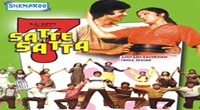
Race Full HD Movie Download

Shadow-The Dark Side of Truth Full HD Movie Download

Seema Full HD Movie Download

Maha Pawan Tirth Yatra (1975) Full HD Movie Download
.jpg)
Nazrana (1987) Full HD Movie Download
.jpg)
Maa (1976) Full HD Movie Download
.jpg)
Bikhare Moti (1971) Full HD Movie Download
.jpg)
Kaccha Yauvan Full HD Movie Download

Hawai Dhamaka Full HD Movie Download

The Great Gatsby Full HD Movie Download

Police Inspector Full HD Movie Download

Family Full HD Movie Download

Sravana Sandhya Full HD Movie Download
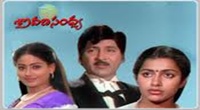
Kalasi Unte Kaladu Sukham Full HD Movie Download

Kudumbam Full HD Movie Download
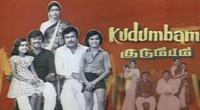
Sandhwanam Full HD Movie Download
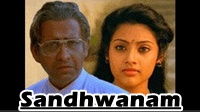
Anbukku Naan Adimai Full HD Movie Download

Aar Paar Full HD Movie Download

Aurangzeb (2013) Full HD Movie Download
.jpg)
Download latest Movie from bollywood
- 1> baaghi 3
- 2> THE SKY IS PINK MOVIE FULL STORY AND REVIEW
- 3> Luka Chuppi
- 4> TO ALL THE BOYS I’VE LOVED BEFORE
- 5> Kabir Singh
- 6> Street Dancer 3D
- 7> Simmba
- 8> Gone Girl
- 9> The Girl Who Lived
- 10> Ludo
- 11> DILWALE DULHANIA LE JAYENGE
- 12> GUILTY
- 13> The Godfather
- 14> Adventures of Rusty
- 15> Sooryavanshi
- 16> Satyameva Jayate 2
- 17> Thappad
- 18> Bhool Bhulaiyaa 2
- 19> KGFChapter 2
- 20> Mardaani 2
- 21> Pinjar
- 22> Shivaji maharaj
- 23> Ek Villian 2
- 24> Hungama 2
- 25> Divergent
- 26> Mumbai Saga
- 27> The Internship
- 28> HIT (telugu)
- 29> Panga
- 30> The perfect date
- 31> 16 December
- 32> Gopala Gopala (Telugu)
- 33> Brahmastra
- 34> Gangubai Kathiawadi
- 35> Manmadhudu
- 36> Nenu local
- 37> Mahanati
- 38> Shatamanam bavathi
- 39> Lagaan
- 40> After
- 41> MOM
- 42> Shamshera
- 43> Raguvaran BTech
- 44> Khakee
- 45> The villain
- 46> OM
- 47> Mr. perfect
- 48> Bueatifull mind
- 49> Hichki
- 50> Gabbar Singh
- 51> Jogi
- 52> Before Sunrise
- 53> Before Sunset
- 54> Before Midnight
- 55> The Big Bull
- 56> Top Gun: Maverick
- 57> The Purge
- 58> The Sky is Pink
- 59> Laxmmi Bomb
- 60> Sadak 2
- 61> Sufna
- 62> Prithviraj
- 63> PK
- 64> Coolie No 1(2020)
- 65> Black Widow
- 66> Dear Zindagi
- 67> Dil Bechara
- 68> PHIR HERA PHERI
- 69> WAR
- 70> Dostana
- 71> RRR: Roudram Ranam Rudhiram
- 72> Maidan
- 73> Dabbang 3
- 74> Chhalaang
- 75> life as we know it
- 76> SherShaah
- 77> Sandeep Aur Pinky Faraar
- 78> Event Horizon
- 79> 83
- 80> Radhe: Your Most Wanted Bhai
- 81> Gunjan Saxena: The Kargil Girl
- 82> Mr India
- 83> Vivah
- 84> Anokha Bandhan
- 85> Ghost
- 86> Bhoot: Part One - The Haunted Ship
- 87> Haseen Dilruba
- 88> Laal Singh Chaddha
- 89> Qismat
- 90> Rajput
- 91> Drive
- 92> Dil Chahta Hai
- 93> Dil Ki Baazi
- 94> Dil Ka Rishta
- 95> Teesri Manzil
- 96> Dil
- 97> Love Aaj Kal
- 98> Khaali Peeli
- 99> Bunty Aur Babli 2
- 100> Atrangi Re
- 101> Gulabo Sitabo
- 102> Jodi
- 103> Suraj Pe Mangal Bhari
- 104> Deewana
- 105> Attack
- 106> Sardar Udham Singh
- 107> Toofan
- 108> THE LOVEBIRDS
- 109> Jersey
- 110> Ginny Weds Sunny
- 111> Thalaivi
- 112> Shiddat
- 113> Angels vs Zombies
- 114> Koi Mil Gya
- 115> Thank God
- 116> Bhuj: The Pride of India
- 117> Hum Aapke Hain Kaun
- 118> The Platform
- 119> Bird Box
- 120> Roohi Afzana
- 121> Torbaaz
- 122> Nikamma
- 123> World War Z
- 124> Extraction
- 125> Train to Busan
- 126> Life of Pi
- 127> SHAADI MEIN JROOR AANA
- 128> Himmat Aur Mehnat
- 129> To All The Boys: P.S. I Still Love You
- 130> Mimi
- 131> Good Newwz
- 132> Shubh Mangal Zyada Saavdhan
- 133> Raabta
- 134> Harry Potter and the Philosopher's Stone
- 135> Harry Potter and the Chamber of Secrets
- 136> Chhapaak
- 137> War of the Worlds
- 138> Harry Potter and the Prisoner of Azkaban
- 139> Harry Potter and the Goblet of Fire
- 140> MURDER MYSTERY
- 141> Shakuntala Devi
- 142> Bachchan Pandey
- 143> Jayeshbhai Jordar
- 144> Sheer Qorma
- 145> Saina
- 146> 'O' Pushpa I hate tears
- 147> Kedarnath
- 148> MS Dhoni The Untold Story
- 149> Chhichhore
- 150> Badhaai Ho
- 151> Unstoppable
- 152> Oz the Great And Powerful
- 153> The Girl on the Train
- 154> Haathi Mere Saathi 2020
- 155> The Conjuring: The Devil Made Me Do It
- 156> Gandhi Se Pehle Gandhi
- 157> The Song of Scorpions
- 158> Srimanthudu
- 159> Hello Guru Prema Kosame
- 160> Beauty and The Beast
- 161> Black Panther
- 162> Charlie and the Chocolate Factory
- 163> Bole Chudiyan
- 164> Fidaa
- 165> Duvvada Jagannadham
- 166> Bruce Lee: The Fighter
- 167> Hyper
- 168> Yaara
- 169> Red (2020)
- 170> Shivam
- 171> That Is Mahalakshmi
- 172> Nishabdham
- 173> Aashram 2020 web series
- 174> Laxmii
- 175> Mismatched
- 176> STUDENT OF THE YEAR 2
- 177> NAIL POLISH
- 178> Ramprasad Ki Tehrvi
- 179> KAAGAZ
- 180> 12 o Clock
- 181> The Power
- 182> bolo hau
- 183> Tribhanga
- 184> JAMUN
- 185> Madam Chief Minister
- 186> Maasaab
- 187> Aadhaar
- 188> Tanhaji
- 189> Bhaagi 3
- 190> Bhootnath
- 191> MALANG
- 192> Jai Mummy Di
- 193> Haathi Mere Saathi 2021
- 194> Shakeela
- 195> Unpaused
- 196> Annayya
- 197> Vamsoddharakudu
- 198> Mrugaraju
- 199> Narasimha Naidu
- 200> Sankranti
- 201> Manasu Maata Vinadhu
- 202> Anjaane
- 203> Apaharan
- 204> Bachke Rehna Re Baba
- 205> Bewafaa
- 206> Roohi
- 207> Radhe
- 208> Zindagi Khoobsoorat Hai
- 209> Yeh Mohabbat Hai
- 210> Yeh Kya Ho Raha Hai?
- 211> The Tomorrow War
- 212> DehradunDiary
- 213> Meri Shaadi Karaoo
- 214> Matruu Ki Bijlee Ka Mandola
- 215> No One Killed Jesica
- 216> Aag Ka Goola
- 217> Eight Million Dollars
- 218> Three Hundred
- 219> Cats and Dog
- 220> Decoy
- 221> Gold Rush
- 222> You Have Got Mail
- 223> Final Destination three
- 224> Tofan
- 225> Jungle
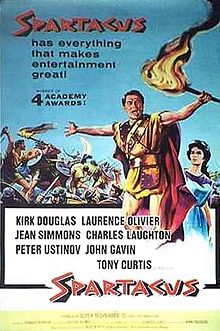 Story of movie Spartacus Film :
Story of movie Spartacus Film : 